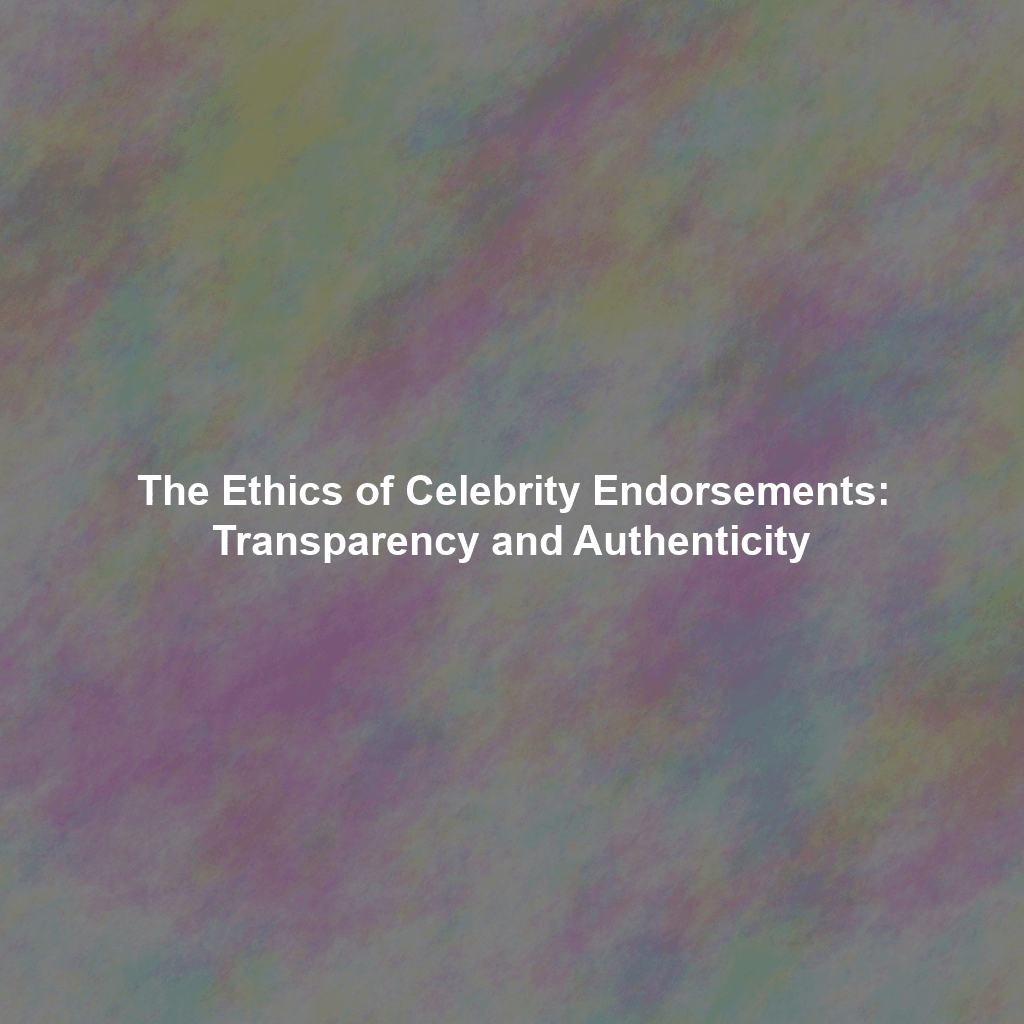Celebrity endorsements: a potent weapon in the marketing arsenal. A well-known face can indeed catapult a brand into the limelight, drive sales figures upwards, and establish recognition with remarkable speed. Yet, beneath the surface of this glitz and glamour lies a critical question: are celebrity endorsements *ethical*? The answer isn’t a simple yes or no. It hinges on transparency, authenticity, and a real alignment between the celebrity and the brand they’re promoting. In this piece, we’ll dissect the ethical considerations surrounding celebrity endorsements and explore how brands can navigate this terrain responsibly.
The Double-Edged Sword of Celebrity Influence
Humans are wired to admire. This admiration often morphs into trust, a potent force that brands are keen to harness. A celebrity endorsement subtly – or sometimes overtly – suggests that if someone we respect uses a particular product, it must be good. This power, however, carries significant ethical weight.
The Fragile Nature of Consumer Trust
Consumers aren’t dummies. They’re increasingly sharp when it comes to marketing tactics. When they sense a lack of genuineness or suspect they’re being misled, trust evaporates. A poorly chosen celebrity endorsement can backfire spectacularly, damaging both the brand’s reputation and the celebrity’s standing. The concept of trust in marketing is crucial; as noted by the American Marketing Association, ethical conduct builds and maintains that trust.
Transparency: The Bedrock of Ethical Endorsements
Transparency is non-negotiable. Consumers have a right to know if a celebrity is being paid to promote a product. Failing to disclose this information is inherently deceptive and can lead to legal trouble. The Federal Trade Commission (FTC) has clear guidelines on endorsements, demanding clear and conspicuous disclosure of any “material connection” between the endorser and the brand.
#Ad: Clarity in Disclosure
The rise of social media influencers has muddied the waters somewhat. Simply stating “sponsored” or using vague terms doesn’t cut it. The use of hashtags like #ad, #sponsored, or #partner, prominently displayed within the post – not buried in a wall of text – provides the necessary clear and unambiguous disclosure. The FTC’s Endorsement Guides offer further clarity on these requirements.
Authenticity: Beyond a Recognizable Face
Consumers crave the real deal. They want to believe that the celebrity genuinely uses and believes in the product they’re endorsing. Selecting a celebrity whose values align with the brand’s is paramount. A mismatch screams insincerity, eroding trust and tarnishing the brand’s image. As Harvard Business Review points out, authenticity builds trust and strengthens customer relationships.
Finding the Right Fit: Brand Harmony
Picture this: a celebrity known for their staunch environmental advocacy endorsing a fast-fashion brand. The disconnect is jarring, immediately raising red flags about the celebrity’s credibility and the brand’s supposed commitment to sustainability. Careful consideration of the celebrity’s public persona, values, and past actions is crucial. Thorough due diligence is essential to ensure a genuine and believable partnership. This isn’t just about surface-level appeal; it’s about a deeper alignment that resonates with the target audience.
Long-Haul Partnerships vs. Quick Flings
A long-term partnership, where a celebrity genuinely integrates a product into their lifestyle, feels significantly more authentic than a fleeting, one-off endorsement. These sustained relationships allow the celebrity to develop a deeper understanding of the brand and communicate its value more convincingly. Think of Nike’s enduring partnership with Michael Jordan – it’s more than just an endorsement; it’s woven into the fabric of the brand.
Potential Landmines and How to Sidestep Them
Celebrity endorsements aren’t without their inherent risks. A celebrity’s personal conduct, scandals, or controversial statements can directly impact the brand they represent, sometimes with brutal speed.
The “Cancel Culture” Phenomenon
In today’s hyper-connected world, celebrities live under constant scrutiny. A misstep, whether recent or from the past, can trigger a swift public backlash and calls for boycotts. Brands need to be acutely aware of this volatility and have a robust crisis management plan ready to deploy. The speed at which public opinion can shift, amplified by platforms like X (formerly Twitter), underscores this risk.
Due Diligence: Know Your Endorser Inside and Out
Thorough background checks are absolutely vital. Investigating a celebrity’s past behavior, affiliations, and any prior controversies can significantly mitigate the risk of a PR nightmare. This includes in-depth social media audits to identify any potentially damaging content. Ignoring this step is akin to playing Russian roulette with your brand’s reputation.
The Trajectory of Ethical Endorsements
As consumers become increasingly savvy and demanding, the call for transparency and authenticity will only grow louder. Brands that prioritize ethical endorsements and cultivate genuine relationships with celebrities are far more likely to achieve sustained success. The focus is shifting from simply leveraging fame to partnering with individuals who genuinely embody the brand’s values and connect with its target audience on a deeper, more meaningful level. This isn’t just about selling products; it’s about building trust and fostering brand loyalty.
Micro-Influencers and the Authenticity Imperative
The rise of micro-influencers – individuals with smaller, but often more engaged and niche audiences – underscores the growing importance of authenticity. These influencers often have a more personal connection with their followers and are frequently perceived as being more genuine and trustworthy than traditional A-list celebrities. Their endorsements often carry more weight with their specific communities due to this perceived authenticity. Research from platforms like Neal Schaffer Consulting highlights the effectiveness of micro-influencer marketing.
In Conclusion: Ethics Drive Endorsement Effectiveness
Celebrity endorsements can be a powerful catalyst for marketing success, but they must be approached with caution and an unwavering commitment to ethical practices. Transparency, authenticity, and genuine brand alignment aren’t just buzzwords; they are the cornerstones of building trust and fostering long-term success. By prioritizing these values, brands can harness the power of celebrity influence responsibly, forge meaningful connections with their target audience, and ultimately cultivate greater brand loyalty and a positive impact in the marketplace. It’s about building bridges of trust, not just broadcasting messages.
 Skip to content
Skip to content

